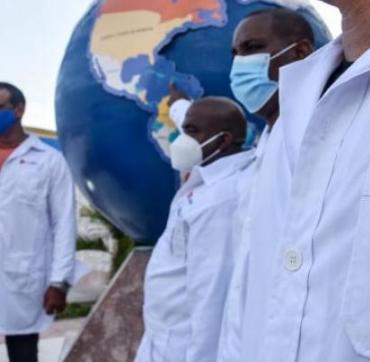Chinese Business Community Will Continue to Invest in and Work with Cuba
especiales

Interview with Oscar Pérez-Oliva Fraga, Minister of Foreign Trade and Foreign Investment, on the Economic Impact of President Miguel Díaz-Canel Bermúdez’s Official Visit to China
The third official visit of President Miguel Díaz-Canel Bermúdez to the People’s Republic of China, held from September 2 to 6, will be remembered for many historical milestones. Yet, the economic aspects of the trip are already generating significant expectations.
Both Presidents Xi Jinping and Miguel Díaz-Canel acknowledge that economic results take time to materialize. That is why, in reaffirming and consolidating the consensus built over recent years, they embraced a key concept deeply rooted in Asian wisdom: perseverance. Both countries, they agreed, must persevere in strengthening their economic and trade relations.
A highlight of the visit was Díaz-Canel’s September 5 meeting in Shenzhen with representatives of more than 70 companies from 15 Chinese provinces, autonomous regions, and municipalities, followed by another meeting the next day with entrepreneurs from the biotechnology and pharmaceutical sectors.
Following these events, Granma spoke with Oscar Pérez-Oliva Fraga, Minister of Foreign Trade and Foreign Investment (MINCEX).
“A Visit of Great Importance”
How would you describe this visit from an economic perspective?
—It has been a visit of great importance for our country, for political, economic, trade, and cooperation relations with the People’s Republic of China.
*“First, the consensus reached by Presidents Xi Jinping, General Secretary of the Communist Party of China, and Miguel Díaz-Canel Bermúdez, First Secretary of the Communist Party of Cuba, was reaffirmed and strengthened.
“During this visit, we had the opportunity to meet with various government authorities and business entities. In Shenzhen, for example, the contribution of Chinese companies supplying strategic products for key sectors of our economy and society was recognized.
“We also confirmed the interest of Chinese entrepreneurs in continuing to participate in vital projects for Cuba’s economic and social development. This includes the transformation of the energy matrix, through various modalities of cooperation. In the coming months, we will receive, through non-reimbursable cooperation, hundreds of megawatts in solar photovoltaic energy.
“Commercially, two large projects of 1,000 megawatts each are underway. The first is expected to be completed by December, and the second will begin in 2026. This will have a highly favorable impact on our energy transition and, above all, on fuel savings.”*
Meeting with Chinese Entrepreneurs
What is your assessment of the September 5 meeting with entrepreneurs from across China?
—Our President routinely meets with business leaders working with Cuba. He has held two prior meetings with Chinese partners, but this gathering, held in China, allowed us to meet with a larger number of them.
*“We updated them on three fundamental issues. First, the processes underway between our governments and institutions to reorganize debt. Government debt has already been restructured, final details are being worked out for financial and banking debt, and conditions are in place to begin gradually restructuring business debt.
“This will improve our ability to engage with Chinese companies and encourage them to play a greater role in Cuba’s development programs. We acknowledged that, despite Cuba’s high debt levels, Chinese entrepreneurs continue to invest in and work with Cuba.
“Second, we defined strategic sectors for bilateral cooperation: food production (both agricultural and industrial), energy, and information and communications technology. Other areas include oil exploration, mining, recovery of the sugar industry, tourism, and trade.
“Third, we discussed steps to facilitate interbank transactions. We are finalizing the integration of Cuban commercial banks into the Cross-Border Interbank Payment System (CIPS), which will allow transactions without U.S. interference. In addition, Cuba will increase the use of the Renminbi for commercial and financial exchanges.
“These two factors—CIPS and the Renminbi—offer greater security and new opportunities for business and investment between China and Cuba.”*
Biotechnology: A Cornerstone of Cooperation
On September 6, before concluding the visit, President Díaz-Canel and the Cuban delegation met with biotechnology companies.
“President Díaz-Canel acknowledged the important results achieved in joint projects in this sector. We currently have three joint ventures in China, where Cuban scientists and institutions are contributing innovative products that are consolidating through cooperation.”
Key Agreements Signed
Beyond the meetings with entrepreneurs, important agreements were also signed at the governmental level.
—Indeed, during this visit, unprecedented agreements were signed.
*“Cuba became the first country to sign an agreement with China establishing the actions and tasks for joint implementation of the Belt and Road Initiative. This was possible thanks to the consensus and shared vision of our two leaders.
“In addition, another agreement defined the main areas of cooperation. Together, these documents serve as roadmaps for implementing what was agreed by Presidents Xi Jinping and Miguel Díaz-Canel.”*
Reactions from the Chinese Business Community
How did Chinese entrepreneurs respond to the proposals presented by President Díaz-Canel and the Cuban delegation in Shenzhen?
—We made it clear that business relations must be based on sustainability and mutual benefit, where both sides share the gains.
*“This principle aligns closely with the philosophy of Chinese entrepreneurs. Many long-standing partners reaffirmed their commitment to continue working with Cuba despite financial constraints. Others, who were unfamiliar with Cuba, expressed interest in specific cooperation areas. Some even joined the biotechnology meeting the following day.
“What stood out from President Díaz-Canel’s exchange in Shenzhen was the clear interest and determination of the Chinese business community to continue betting on Cuba and contributing to our development.”














Add new comment